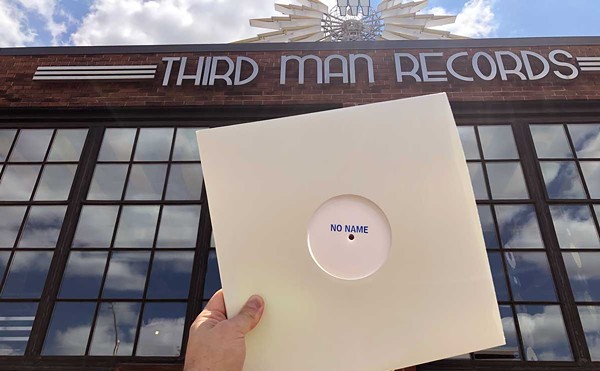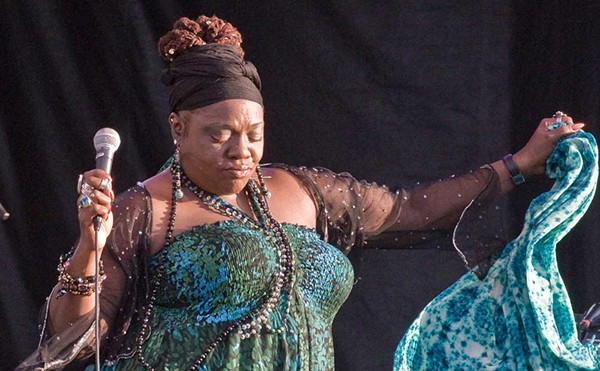Andy Bey snagged the vocalist of the year award from the Jazz Journalists Association the other night. The journalists’ award — which Bey took for the second year running — was hardly a shocker, since they’re the same folks who’ve been straining for nearly a decade for the mot juste to describe him and his aged-in-soul voice: “juju medicine bluesman” … “prayer-like reveries” … “burnished glow with exotic oil.”
Yet for many years, Bey was rarely written about — or heard at all — outside of New York. He recorded in the ’60s with siblings Salome and Geraldine as Andy Bey and the Bey Sisters. He sang with Horace Silver, Gary Bartz and a number of others. But he recorded just one album as a leader — 1974’s Experience and Judgment — prior to the four amazing discs that turned Bey, now in his mid-60s, into a late-life hero.
And curiously enough, the story of Bey’s big decade was set in motion by a longtime Detroit defense attorney with an idea for a little project — with another singer.
“I wanted to have some songs recorded for my own personal benefit,” said the attorney, Cornelius Pitts. He wanted songs dating back to World War II and “that certain ambience.” The record in Pitts’ head featured Earl Coleman, little-recorded but legendary among the in-crowd as one of the few vocalists to record with Charlie Parker. Detroit drummer Roy Brooks put Pitts in touch with Coleman, whose price “was much too high for a personal recording,” said Pitts.
Then Brooks called Bey. “I hadn’t seen him in years,” Bey said during a phone conversation last week. (Both of them had worked with pianist Horace Silver, though not at the same time.) “He called me out of the blue and said a guy was looking for someone to do a record, a no-frills record. … I didn’t take it too serious. I said, well, if it happens it happens.”
When Pitts called later, things did begin to happen. Pitts pulled in Herb Jordan, a fellow lawyer and a former Detroiter, as producer. In a small studio in New York’s Chinatown, the “personal” recording grew into Shades of Bey, which in 1996 came out on the Evidence label and began the Bey revival.
When asked, Bey confessed to being a little surprised by the chain of events. But in his life-view, the question isn’t the most relevant: “I don’t really think about it that much, I just take one day at a time, because everybody seems to think that I’ve been away, or went through a hiatus, but I was right here all the time.”
“Everything he’s receiving now is overdue,” said Pitts. “He’s the man.”
And Pitts and Jordan have remained parts of Bey’s evolving career, more recently bringing into the fold yet another Detroiter, Geri Allen, as a pianist and arranger. Bey credits Jordan with, among other things, some of the less-obvious selections on his recordings — Nick Drake’s “River Man” and Sting’s “Fragile,” Bix Beiderbecke’s “In a Mist” as a wordless-vocal workout and Jordan’s own “Tuesdays in Chinatown,” which became the title track to Bey’s third release.
As to Allen, said Bey: “She’s always going to throw some idiosyncratic qualities in her writing and give you a chance to stretch and think about some other things.”
Bey’s schedule is hectic these days. He talked the other day in the midst of preparing for a trip to the Netherlands to perform with the Four Brothers, an all-star singers’ group led by Kurt Elling and including Giacomo Gates and Mark Murphy. He was to come back to New York then re-cross the Atlantic for a Paris gig, then back to the Netherlands for the North Sea Jazz Festival, then on to Boston and Ann Arbor.
He talked about the “indelible” influence that Nat King Cole left on him (“I saw him when I was 11 years old”) and about not being influenced by Johnny Hartman, outward similarities in their baritone voices notwithstanding. He talked about being able to project “the different sides” of his personality, the freedom to express vulnerability, the hurdles black male singers face in the business and “clueless” record companies.
And he talked about the secret to being a better artist in being a better human being.
Andy Bey performs two shows, 8 and 10 p.m., Saturday, June 26, at the Firefly (207 S. Ashley, Ann Arbor); call 734-665-9090.
Read W. Kim Heron's review of Andy Bey's latest release here. W. Kim Heron is Metro Times managing editor. E-mail [email protected].





